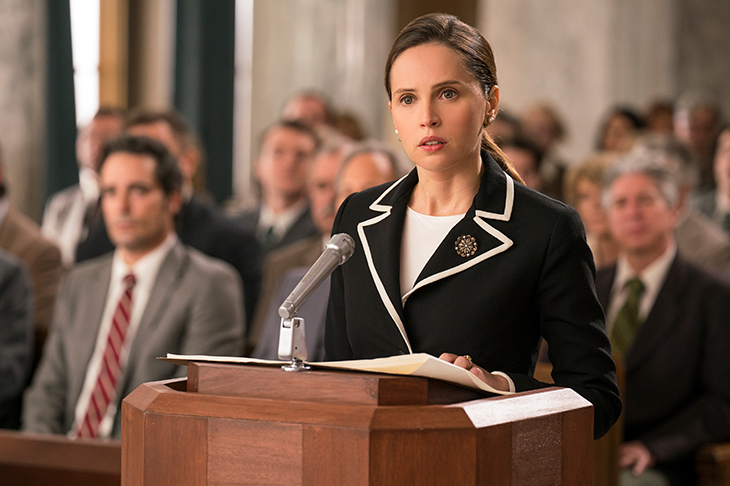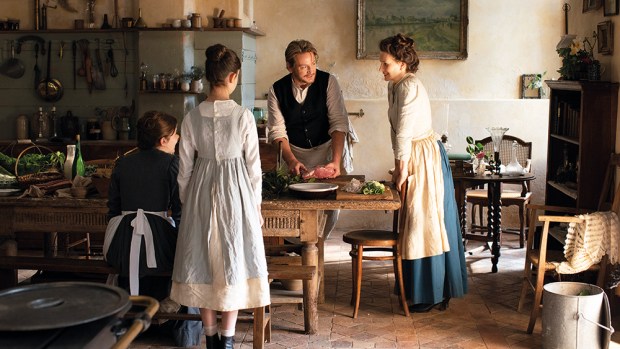Ruth Bader Ginsburg is too ill to sit on the Supreme Court. When she saw On the Basis of Sex, a hagiography written by her nephew, she must have thought she had already gone to heaven. Directed by Mimi Leder to the highest TV-movie standards, this prequel to the obsequious 2018 documentary RBG will appeal to all purchasers of the grovelling 2015 biography, Notorious RBG.
The real RBG totters across the last frames of this movie like the laminated ghost of American liberalism. Such idolatry diminishes Bader Ginsburg’s achievement, the unpicking in 1971 of the first of 178 laws discriminating against you-know-who on the basis of you-know-what. But this film crackles with nylon, self-regard, and unearned privilege.
It’s the 1950s. Ruth and Marty are top students at Harvard Law, and newlyweds with a baby daughter. One night, Marty collapses during an Elvis impersonation and is diagnosed with testicular cancer. When Marty loses a ball, Ruth saves his career by attending his lectures as well as hers. But when Marty lands a job in New York City, he wears the trousers. The law is for men, and Ruth is ‘a woman, a mother, and a Jew to boot’. Marty becomes that fiscal oxymoron, a hot tax lawyer. Ruth sinks to a mere professorship.
Yes, it’s now the 1960s. Ruth (the remorselessly perky Felicity Jones) has an epiphany at an anti-Vietnam protest. And another when her teenage daughter confronts a sexist construction worker. And another when she realises that Brown vs Board of Education, the 1954 ruling that desegregated American schools, might be extended to sexual discrimination.
The 14th Amendment makes all Americans equal under the law, and is a powerful legal instrument when invoked without laughter. Ruth consults Dorothy Kenyon (Kathy Bates), a bag lady who used to be a feminist lawyer, and Mel Wulf (Justin Theroux), a corduroy-clad comedian from the ACLU. But it’s Marty, semi-gelded and a bit guilty too, who confesses that Section 214 of the tax code is the patriarchy’s weak spot.
In Denver, the IRS has denied a $296 deduction to a bachelor caring for his elderly mother: section 214 grants deductions to a husband, a widower, or a woman. Ruth wants to argue for sexual equality on principle, but Marty the tax lawyer advises her to ‘evade’ the social implications. Ruth persuades the Denver bachelor to let her represent him and all Americans, even the men.
‘We’re counting on you, too,’ says Marty, meekly. Marty has a top lawyer’s workload, he necks martinis like Don Draper, and he does the cooking too. He is the first person ever, male or female, to have it all. As Marty, Armie Hammer is more wooden than his Danish modern furniture. Perhaps he’s exhausted and disillusioned.
In her courtroom debut, Ruth the liberal icon sways the three elderly patriarchs on the bench with the now-conservative argument that race and sex are ‘unalterable traits’. The consequence? Women are freed to compete equally with men, and depress lower-income wages accordingly. Higher-income people such as Ruth and Marty will do just fine, and will sustain their conservative ideals about the two-parent family by outsourcing the nannying, cooking and cleaning to low-income, mostly immigrant women.
‘Let’s get pizza,’ Marty says on the steps of the courthouse. As we all now must. For if everyone works, who has time to cook the kids’ dinner?
Got something to add? Join the discussion and comment below.
Get 10 issues for just $10
Subscribe to The Spectator Australia today for the next 10 magazine issues, plus full online access, for just $10.
You might disagree with half of it, but you’ll enjoy reading all of it. Try your first month for free, then just $2 a week for the remainder of your first year.














Comments
Don't miss out
Join the conversation with other Spectator Australia readers. Subscribe to leave a comment.
SUBSCRIBEAlready a subscriber? Log in